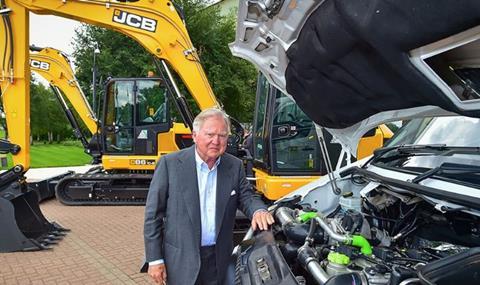
JCB is hailing a second major breakthrough in its drive to convert to hydrogen-powered vehicles after installing one of its hydrogen engines into a Mercedes-Benz Sprinter van.
This latest development follows the plant manufacturer’s installation of its hydrogen engine into a 7.5-tonne Mercedes truck in February this year.
The Mercedes-Benz Sprinter van retrofit was completed in just two weeks and one of the vehicle’s first test drivers was JCB chairman Anthony Bamford (pictured), who is leading the company’s £100m hydrogen engine project.
The internal combustion engine used in the Sprinter van is the same as those already powering prototype JCB construction and agricultural machines.
Lord Bamford said: “We have retrofitted this vehicle with a JCB hydrogen engine to demonstrate how simple it will be to convert existing vans and to show that it is not only construction and agricultural machines that can be powered by hydrogen.
“While converting vans will not be for JCB to do, it does prove there is something else other than batteries that can work very effectively.”
JCB has already manufactured more than 70 hydrogen internal combustion engines in a project involving 150 British engineers and they now power prototype JCB backhoe loader and Loadall telescopic handler machines.
The company said the converted van “underlines that this form of power could represent a much quicker way to reach global carbon dioxide emissions targets”.
The company’s hydrogen internal combustion engines are manufactured at JCB Power Systems in Derbyshire.
Engineers at JCB Power Systems began by developing a prototype backhoe loader, fitted with a new hydrogen motor, which the company claims can can do everything its diesel-powered equivalent can do, using technology is “far less” complicated than hydrogen fuel-cell technology.
For more stories tracking the industry journey to decarbonisation see our new Freight Carbon Zero website.










